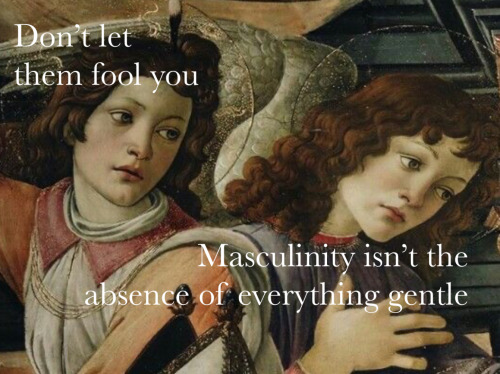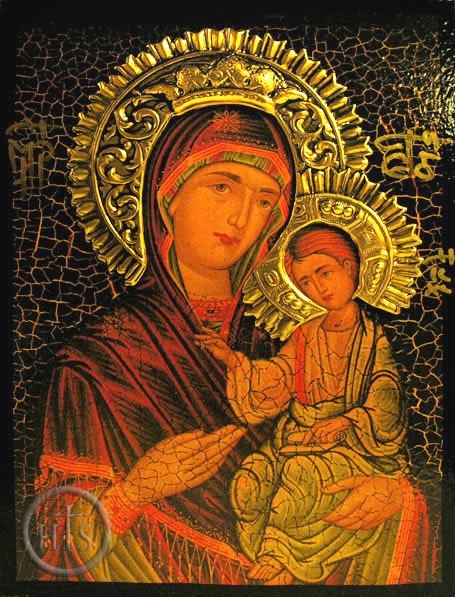20s. all pronouns. religious sideblog. greek orthodox. just a place to reblog stuff so as to not annoy my followers on my main @fluxofdaydreams
170 posts
Latest Posts by quovadisjeanne - Page 2
halos are fun but tbh realistically i think that saints would just have heads burning up with holy fire from the inside out. they'd be uncomfortable to look at, not only because they burn so bright and billow with smoke and flame, but because of the abjectly contradictory, miraculously terrible nature of it. headless but whole. dead yet alive.
just heard “turns out, shockingly, that you can’t pray away your gay thoughts because you can’t pray away your capacity for love” from a wise Christian queer man on a tiktok comp, and i thought it’d be wise to share
lord above blessed be the queer kids this Easter. for you died to save each and everyone of us. our queerness is not a sin, but a gift, and you rose again to let us live a life in love. I love you I love you I love you.


My hope is in Him.
you don’t hate modern religious music, you hate megachurch worship bands that play to packed stadiums and roll in cash while writing the most stereotypical and soulless lyrics imaginable

My current icon is that of the Theotokos as the Softener of Evil Hearts. May she bless your dash and help soften even the hardest of hearts.
I feel like Catholics and other Christians tend to hold up the Holy Family as the ideal role model of a nuclear family; but Mary was pregnant outside of wedlock, and Joseph was not Jesus's bio dad. The Holy Spirit (the One Who conceived Jesus) is referred to with feminine language in the original text of the Scripture. According to the Church, Mary and Joseph never consummated their relationship; instead adopting more kids. At Jesus' request, John the Beloved took in Mary as his own Mother--that's chosen family.
None of these things exactly fits the ideals of a nuclear marriage and family which Christians espouse--in fact, it would be considered scandalous. But they were a Holy Family nonetheless. It's almost like family can be complicated and not fit into lines or boxes, and still be built on love and honoring to God
jesus did not appear to his mother first. some may say that, but the title of the first seeing, the apostle of apostles, belongs to mary magdalene, the saintly penitent-- the bible tells us so. god in flesh appeared not to his rock, but to little magdalene. she is quick to tell all, even when others look at her with disbelief and, maybe, even a little fear. she's seen him! the christ! how could she keep her lips sealed? it would be like asking her heart to stop in her chest.
when she tells mary, mary weeps. mary believes-- always has, ever since the savior of all was but an embryo in her womb. since he was a helpless infant at her breast. a mischievous child. the boy who would pierce her heart. yes, mary knows that her son has risen, believes the magdalene with her whole heart.
but
but where was he? why had the other marys seen him, and the rock, and the beloved, why had he appeared to them all but not her? and mary, mother of god, the mother of humanity, doubts. not in her son's brilliance. not in his resurrection, or in his love of her. she doubts herself. why would he not come to her? had she failed him so on calvary, standing and weeping, that he no longer wished to see her? was he angry? she knew he loved her, as he loved all, but it hurt, hurt to see the magdalene's happy tears and know not if he smelled the same reborn as he did when she first held him.
mary weeps. not in front of the others, her children, her boys and girls, beloved disciples of her christ, but alone, as she prays.
"woman, why are you crying?"
the voice is soft, and mournful. there is guilt hidden there, that only a mother could hear. and at once, she is back, back with her embryo, back with her baby, her mischievous child marred with holes. he is wounded, scarred, perfect, and he is alive.


Saint Michael and the Fascist // inspired by Raphael’s “Saint Michael Vanquishing Satan”
We needdddd a transgender spear of divine justice as of late yall
Jesus, appearing to the disciples after the crucifixion: peace be - stop screaming, it's just me - peace be unto you


(detail from the San Barnaba Altarpiece (c. 1488) by Sandro Botticelli)
just. john the apostle. john the beloved. john the youngest. john who rests his head on jesus' shoulders while he speaks. john who stayed with the women during the passion & wasnt ashamed of sharing their pain. john who got to the empty tomb before anyone else. john the patron saint of love & friendship & loyalty & writers & poets. my good friend john
Sorry, but I'd rather accidentally love too many people than too few. I'd rather accidentally welcome people I'm not supposed to than exclude people I'm supposed to welcome. I think God looks much more kindly on one of those than the other.









Art of Mother Mary and baby Jesus from:
India, Iran, Indonesia
Ethiopia, Peru, Korea,
Russia, Turkey, Greece
sorry, if your veneration and love of Mary comes ONLY because of her virginity and because of her womb, and not because of her loving nature, not because her charity and humility and devotion and strength of faith, not because she was so good in her humanity that she was singled out by God, not because she dedicated herself to her Son despite knowing her heart would be pierced— not because she was a good person, but because you see her as a walking untainted vagina and incubator— you don’t love the mother of God for herself, just for her body parts.

ᴋɪꜱꜱɪɴɢ ᴛʜᴇ ꜰᴀᴄᴇ ᴏꜰ ɢᴏᴅ ᴍᴏʀɢᴀɴ ᴡᴇɪꜱᴛʟɪɴɢ
fanart of jesus holding a hippo was not on my 2024 bingo card

“Then when G-d asks [Cain], ‘Where is your brother Abel?’ he arrogantly responds, ‘I do not know. Am I my brother’s keeper?’ In essence, the entire Bible is written as an affirmative response to this question.”
— Rabbi Joseph Telushkin, Jewish Literacy (via ourwakingsoules)

Christ
J. Kirk Richards
2019
someone on Discord brought up Romans 1:26-27 and activated my autistic avatar state and I ended up writing a little essay that's basically a summary of the argument Daniel A. Helminiak makes that Romans 1:26-27 is not a condemnation of homosexuality or homosexual acts in his book What the Bible Really Says About Homosexuality
and I thought I'd share it here in case someone else is interested
it basically covers 3 main points:
1. what does Paul mean by things being natural or unnatural? 2. the distinction between impurity/uncleanness, and evil/sin. 3. the purpose and rhetorical structure of Paul's letter to the Romans.
keep in mind I am by no means an expert, this is just my summary of Helminiak's argument, which I happen to find very convincing. there's a lot of details and corroborating evidence left out here, if you want the full thing, I can recommend the book! I enjoyed reading it, and it also has interesting things to say about other 'clobber passages'
essay under the cut!
1. Unnatural, or contrary to nature?
So first, what does Paul mean when he calls things natural or unnatural? When we read these words nowadays, there is usually a strong moral value attached to them. When people call things 'unnatural', it means they violate some important law of nature, they are abhorrent and wrong and bad. There is, however, a lot of evidence that this is NOT how Paul uses the term (the Greek here being "para physin"). This is a term he uses many times in multiple letters, simply to mean that someone is doing something beyond what one would usually expect. It clearly has no inherent moral value to him, because he even says there are things God does that are "para physin"! So instead of 'unnatural and abhorrent and bad', we should read it more like: "contrary to her nature, Judy was super chipper this morning! she usually isn't a morning person", or "James is always so kind, but contrary to his nature, this morning he just snapped at me". In this case, by calling these acts "para physin", he is probably saying that these people are doing things that are against social norms and expectations, and/or that they are doing things that don't fit with their usual behavior.
2. Uncleanness vs sin
Second, we have the distinction between things being ritually unclean, and things being evil/sinful. Helminiak goes deep into the intricacies of Jewish law to support this point, but I'll just jump straight to the conclusion, and recommend that you read his book if you feel it needs more justification. Basically, the core is as follows:
- There are things that are considered evil, sinful, bad, morally wrong, for example murder, selfishness, exploitation of others, etc. - There are also things that are considered unclean, but not morally wrong. This is a lot of what is described in Leviticus, for example, and Helminiak uses this same distinction to clear up the infamous clobber passage from Leviticus about men lying with men. Now, these purity laws in the Pentateuch are not unimportant - when they were made, they were extremely important to the Jewish people to set them apart from others. These are the 'holy' laws after all, in the original Hebrew sense of the word meaning things that are different, set apart. They were extremely important for the formation and protection of the Jewish identity. - In many places in both Paul's writings and others' writings in the New Testament, it is made clear that this second set of laws, I'll call them purity laws, do not need to apply to gentile converts. Essentially, they are still highly respected as Jewish law, but they are not carried over to any non-Jewish people who follow Jesus because, once again, these are about the Jewish people and the Jewish identity.
This gives us a distinction between impurity (relevant specifically to Jewish people), and sin/evil (relevant to everyone). According to Helminiak, this distinction was also already accepted by Jewish people at the time, to be clear, so this is not something imposed in hindsight.
Paul uses this distinction in Romans 1. Verses 21-32 have the following structure: 21-25: These people worship idols instead of God! There are consequences to this.
26-27: They do things that are ritually impure/unclean, and also are socially unacceptable and frowned upon. They suffer public shame as a consequence.
28-31: Additionally, they do things that are evil/sinful, and for that, they deserve death.
So the stuff Paul says about homosexual acts, is separate from the things he condemns that are evil and sinful. There is no clear moral judgment about the homosexual acts here.
This leaves us with a question: if Romans 1:26-27 is referring to laws that are only relevant for Jewish people, and Paul is talking about non-Jewish people, why does he even bring them up??? To answer this, we have to proceed to our third major point.
3. The rhetorical structure of Paul's letter to the Romans
We have to consider in what situation Paul is writing this letter, and for what purpose. He is writing it to a congregation that is a mix of Jewish people and non-Jewish converts, and there is animosity between them. This was very common, and one of the major points of contention between these two groups of people was usually precisely the thing we just talked about: cleanness and uncleanness. For example, there was a lot of conflict around food, with the gentiles eating food considered unclean by the Jewish people, and the Jewish people being upset by that.
Paul's goal is to help them reconcile. But, Paul being Paul, he doesn't do this by saying "I wish I could bake a cake filled with rainbows and smiles and everyone would eat and be happy." No, he does this by saying "why do you look at the speck of sawdust in your brother's eye and pay no attention to the plank in your own eye?"
When we look at the rhetorical structure of the letter, we see that Paul does the following things: - Sympathize with the Jewish people to get them on his side. Because aren't these gentiles just gross and awful? - UNO REVERSE! Actually you, Jewish people, you also do things that you consider unclean, and things that you consider sinful! So stop judging - Sympathize with the gentiles to get them on his side. Because aren't these Jewish people so annoying? - UNO REVERSE! Shut up, you're no better than anyone else!
So by bringing up these unclean/impure things in 1:26-27, Paul is sympathizing with the Jewish people in the congregation to get them on his side, to get them listening to him, only so he can turn it around later.
It's like if I were trying to convince a loud conservative of something, I might do so by first sympathizing with them to get them on my side, so that then I can flip things. I could say: "Ah yes and these liberal snowflakes are so dramatic, aren't they? They are always overreacting to things, they make such a big deal out of tiny little things like which exact words you use. Right? Don't you think so? But look, see! You are no better! You also overreact and can be dramatic! Because you act like it's a huge burden to use the right pronouns for someone, like your rights are being taken away from you just because someone wants you to use they/them pronouns!"
So, now that we have examined all of this, I think it's safe to say: taken in context, these verses really aren't what they seem to be in isolation. And they are most likely not a condemnation of homosexuality or homosexual acts.

instagram comment i saw and loved

guys jesus is trending on twitter
jesus and the samaritan woman at the well




Finally have all 4 life stages let's gooo


medieval heart-shaped prayer book in a medieval painting and in real life

streetcar madonna, crike

The Sermon on the Mount block print by Sarah Hawkes

cat with orthodox icons





